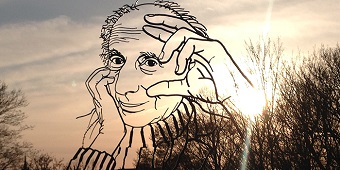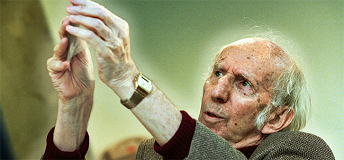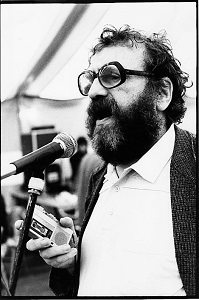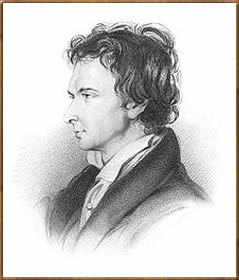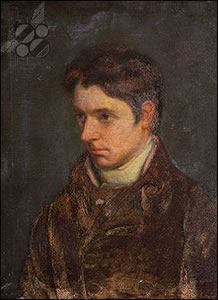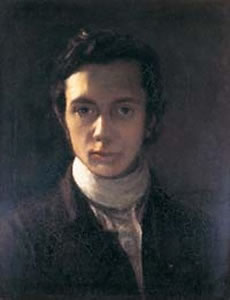De Nederlandse dichter Leo Vroman werd op 10 april 1915 in Gouda geboren. Zie ook alle tags voor Leo Vroman op dit blog.
Een klein draadje
Met dat hoofd gebeurt nog eens wat.
Het gelaat ligt me al te plat
op de vette hersenkast.
Er gebeurt vast wat.
O, als ooit dit peinskistje splijt
als een vrij eetbare brei
verschijnt dan dit brein van mij
en bevlekt met gedachten de grond
maar de dood verzegelt mijn mond,
en minder dood dan wel veilig
sterft het schijnheilig.
Door de dood word ik graag overmand.
Ik vrees meer mijn gezond verstand.
Ik vrees dat leger van spinnen –
– de zenuwcellen daarbinnen.
Dat vreselijk web vol webben
kan ik eigenlijk niet goed hebben.
Wat zou er b.v. gebeuren
als twee draadjes zouden scheuren
en contact maken met elkaar
onzichtbaar, diep onder mijn haar,
terwijl ik uitwendig zo
maar in een winkel bezig ben
groenten en vlees te ko-
pen…
Er knetteren geen vlammen en vonken.
Iemand zegt: is hij dronken?
Opeens zit ik voor ons huis op de stoep
met zes duizend blikken soep.
En zegt mijn tedere vrouw:
lieverd, wat doe je nou?
Dan zeg ik: nu gaan we eten,
o nee, ik ben de soep vergeten.
Gebeurt het onder het dichten,
wie purp publiek dan inlichten
dat dit geen genialiteit
maar een purpje los is, of kwi
jt? Een draadje dat stroom opslurpt
van murp gedachtengurpt.
En kurpsluiting leidt tot brurp –
Brarp! Hurp! Hurp!
Lekker niet
Ach hoe verdacht lekker
languit in bed en
dat ik die wekker
niet hoef te zetten
vannacht
morgen niet met die pijpen va de
onder- en bovenbroek hoef te worstelen,
geen mensenvlees en tanden
meer hoef te borstelen,
geen griezelige roem en
geen angstig nieuw boek!
S.v.p. geen bezoek
en geen bloemen
Einde
Hij lijkt vast minder erg –
die lief bijeengebrachte
hoop spaanders van mijn gedachten –
op mij dan een berg.
Waar zal die laaiende gestalte
van mij dan uit bestaan
en waar kwam die al te late
eerste vonk vandaan?
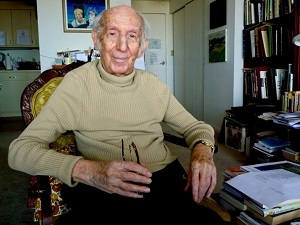
Leo Vroman (10 april 1915 – 22 februari 2014)
De Nederlandse schrijver Jan van Mersbergen werd geboren in Gorinchem 10 april 1971. Zie ook alle tags voor Jan van Mersbergen op dit blog.
Uit: De laatste ontsnapping
“Gordels om, knippert het lampje.
Volgens mij is het de eerste keer dat hij zichzelf aan een stoel ketent en ook de eerste keer dat hij dat doet omdat een ander hem dat vraagt, eerst dat lampje en nu een blonde stewardess met een groene rok en dunne benen.
Zijn zoon Deedee zit links naast hem aan het raampje. Hij klikt ook zijn gordel vast.
De motoren zoemen al. We gaan opstijgen, we gaan naar de zon, naar het strand, naar het feest. Ik heb er zin in, echt.
In de auto naar het vliegveld deed hij zijn riem niet om. Ik zei er niks van. Toen we vlak bij het vliegveld waren vroeg ik hem hoe hij zich voelde nu ze samen op reis gingen, hij en zijn zoon. Hij dacht lang na. Toen zei hij: Ik ben nog nooit zo bang geweest.
Ik kon het wel aan hem zien. Hij was heel stil. Nog stiller dan anders. Ik liet hem een tijdje zo naast me in de auto zitten. De jongens zaten op de achterbank, mijn zoon Ruben en Deedee, beste vrienden. Ze keken uit het raam en telden vrachtwagens, ze volgden het gesprek niet. Ze waren al over de vierhonderd.
Nog nooit zo bang geweest.
Vlak voor we vertrokken zocht ik hem thuis op. We zaten op zijn balkon. Ik vroeg hem of hij nog mee wilde. Ik had hem een tijd niet gezien en hoopte dat hij wel zou gaan. Ik hoopte het echt want die jongens keken ernaar uit en zonder zijn act zou het gewoon een normale vakantie zijn. Ook toen op dat balkon zei hij lang niets en legde een hand op mijn arm en zei: Toen ik alles kwijtraakte verloor ik ook de angst om alles kwijt te raken.
Heel lang was hij nergens bang voor, echt nergens voor. Vrij als een vogel die zomaar ergens heen kan vliegen, niet omdat hij voedsel moet zoeken of omdat hij dorst heeft, omdat hij moet schuilen voor de regen, gewoon omdat hij op deze wereld is en zijn plek niet alleen hier is maar ook daar, aan de andere kant van die schutting, hoog in een boom, over de schoorstenen, op een oude antenne op een of ander dak.”
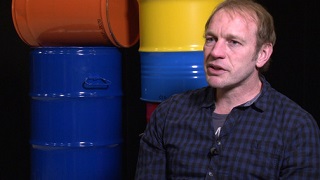
Jan van Mersbergen (Gorinchem, 10 april 1971)
De Amerikaanse schrijver Paul Edward Theroux werd geboren op 10 april 1941 in Medford, Massachusetts. Zie ook alle tags voor Paul Theroux op dit blog.
Uit: Hotel Honolulu
“Nothing to me is so erotic as a hotel room, and therefore so penetrated with life and death. Buddy Hamstra offered me a hotel job in Honolulu and laughed at my accepting it so quickly. I had been trying to begin a new life, as people do when they flee to distant places. Hawaii was paradise with heavy traffic. I met Sweetie in the hotel, where she was also working. One day when we were alone on the fourth floor I asked, Do you want to make love? and she said, Part of me does. Why smile? At last we did it, then often, and always in the same vacant guest room, 409. Sweetie got pregnant, our daughter was born. So, within a year of arriving, I had my new life, and as the writer said after the crack-up, I found new things to care about. I was resident manager of the Hotel Honolulu, eighty rooms nibbled by rats.
Buddy, the hotel’s owner, said, We’re multistory.
I liked the word and the way he made it multi-eye.
The rooms were small, the elevator was narrow, the lobby was tiny, the bar was just a nook.
Not small, Buddy said. Yerpeen.
I had gotten to these green mute islands, humbled and broke again, my brain blocked, feeling superfluous, out of the writing business, and trying to start all over at the age of forty-nine. A friend of mine recommended me to Buddy Hamstra. I applied for this job. It wasn’t for material; it was the money. I needed work.
My manager’s a typical local howlie — a reetard, Buddy said. Fondles the help. Always cockroaching booze. Sniffs around the guest rooms.
That’s not good, I said.
And this week he stepped on his dick.
Not good at all.
He needs therrpy, Buddy said. He’s got lots of baggage.
Maybe that’s what he likes about the hotel — that he has a place to put it.
Buddy sucked his teeth and said, That’s kind of funny.
The idea of rented bedrooms attracted me. Shared by so many dreaming strangers, every room was vibrant with their secrets, like furious dust in a sunbeam, their night sweats, the stammering echoes of their voices and horizontal fantasies; and certain ambiguous odors, the left-behind atoms and the residue of all the people who had ever stayed in it. The hotel bedroom is more than a symbol of intimacy; it is intimacy’s very shrine, scattered with the essential paraphernalia and familiar fetish objects of its rituals. Assigning people to such rooms, I believed I was able to influence their lives.”
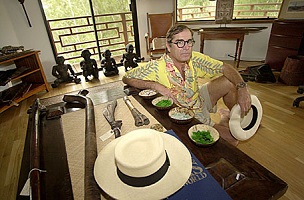
Paul Theroux (Medford, 10 april 1941)
De Italiaanse schrijver en vertaler Claudio Magris werd geboren op 10 april 1939 in Triëst. Zie ook alle tags voor Claudio Magris op dit blog.
Uit: Het museum van oorlog (Vertaald door Linda Pennings)
“Gebruikte onderzeeërs — inkoop en verkoop. De annonce in de Piccolo banditore was van 26 oktober 1963; kennelijk zag hij zich gedwongen —toen hij was overladen met schulden, misleid door de miljoenenbeloften van verschillende instanties en zelfs ministeries, afgeperst door woekeraars, belaagd door de eigenaren van de terreinen en hangars waar hij zijn vliegtuigen en gebombardeerde legerbruggen had opgesteld — om enkele stukken van grotere tonnage te verkopen, maar was hij op het moment dat hij tot verkoop besloot meteen weer in de greep van zijn Furiën geraakt en probeerde hij ook te kopen, onduidelijk met welk geld, maar hoe dan ook te kopen: duikboten, pantservoertuigen of toestellen voor het vegen van mijnen. Dat kon het begin zijn; het voorportaal van het Museum, waar je binnenkomt. Aan de wand tegenover de bezoeker een groot zwart scherm, bewogen door een vage rimpeling, geluid van water op de achtergrond; zijn gezicht verschijnt in dat donker, een foto van begin jaren zeventig. Een hoofd dat uit de zwarte wateren opdoemt, schichtige, schrandere ogen; straaltjes zweet, waterdruppels druipen langs de Pannonische jukbeenderen. Midden in de zaal de onderzeeër, een U-boot van de Kaiserliche und Kaigliche Kriegsmarine uit de Eerste Wereldoorlog, onduidelijk hoe verworven of verkregen. Gebruikte onderzeeërs — inkoop en verkoop. Een pompeuze, insinuerende stem. Gereconstrueerd, kundig samengesteld uit verschillende radio-opnamen van Radio Triëst. Een onschuldige handelsadvertentie die dankzij de stem — gemonteerd en dus echt, wezenlijk, niet toevallig en veranderlijk zoals op het moment van praten — een lokaas wordt, het aanbod van een pooier in de schaduw. Het Museum betreden zoals je een nachtclub betreedt, beloftes in neonlicht; dat kan een goed idee zijn, dacht Luisa. Ook al ontbrak de hoofdattractie, het meest gezochte en besproken kopstuk, die befaamde dagboeken. Een inwijdingsmysterie waarin het dulcis in fundo, de korenaar die de adept zegent, ontbreekt. De familie was daarover duidelijk geweest, in die brief gericht aan de directeur van de Corriere Adriatico en met groot vertoon gepubliceerd. `…Staat u ons toe, als zijn erfgenamen, om uiting te geven aan onze verbijstering en ontsteltenis over het op 12 maart jongstleden in uw krant gepubliceerde bericht. Wij begrijpen niet met welk recht en op welk gezag kan worden aangekondigd dat ook zijn dagboeken — duizenden bladzijden van genummerde schriften, met diverse verwijzingen en aanvullingen — tezamen met het omvangrijke oorlogsmaterieel zullen worden ondergebracht in dat Museum gewijd aan de documentatie van de oorlog ter verheerlijking van de vrede, een Museum dat hij, met zijn rijke maar altijd doordachte verbeelding, besloten had “Ares voor Irene” te noemen, de god van de oorlog die een apostel voor de vrede wordt.”
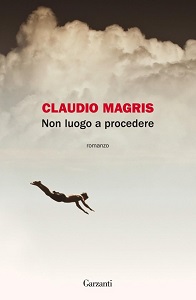
Claudio Magris (Triëst, 10 april 1939)
Cover oorspronkelijke uitgave
De Russische dichteres Bella Akhmadulina werd geboren op 10 April 1937 in Moskou. Zie ook alle tags voor Bella Akhmadulina op dit blog.
Farewell
And I shall tell you at the end:
farewell, don’t pledge self to love, helpless.
I go mad, or just ascend
to the high echelon of madness.
How had you loved? – You’d put aside
even the Death. But ‘tis not matter.
How had you loved? You’d done that right,
but you had had to do that better.
Hell of a blunder! I shall not
Forgive you else. It lives – my body –
it roams, sees the real world,
but just with emptiness it’s loaded.
My mind yet makes its scanty work,
But arms had helplessly felled down,
and, likewise a small airy flock,
vanish aslant all smells and sounds.
Incantation
Don’t mourn for me – I shall survive –
The kind convict, the somewhat happy pauper,
The frozen southerner inside the Pole Circle,
The angry northerner in the consumption’s locker
On the mosquitoes South – I shall survive.
Don’t mourn for me – I shall survive –
The little lame-one, begging in the parvis,
The drunken-one, that’s left amidst the tables,
And this one, daubing just the image Marie’s,
That God’s bad painter – I shall, yet, survive.
Don’t mourn for me – I shall survive –
The girl, in rules of grammar-books unblemished,
Which, in the future undefined and selfish,
Like a dull fool, under my fringe, the reddish,
Will know my verse. For sure, I will survive.
Don’t mourn for me – I shall survive –
The one who’s kinder than the fresh wounds’ nursing
Under the crazy military bursting,
Under the star of mine, that’s ever glossing…
In any way … I’ll really survive.
Vertaald door Yevgeny Bonver
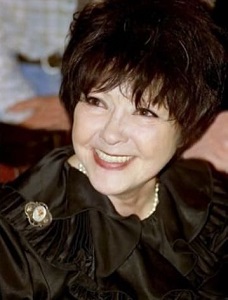
Bella Akhmadulina (Moskou, 10 April 1937)
De Duitse dichter en schrijver Stefan Heym (eig. Hellmuth Flieg) werd geboren op 10 april 1913 in Chemnitz. Zie ook alle tags voor Stefan Heym op dit blog.
Uit: The Architects
“They would soon reach Brest, he heard one of the guards mention. The guards were playing dominoes, noisily banging the small black pieces on a board laid across their knees, and smoking Machorka. The car swayed and rattled, and the stench of sweat and agony refused to lift despite the open vents and door. Brest, he thought. Since last year—this much had penetrated taiga and prison wall—the town and fortress of Brest had been Soviet. Beyond them lay the border, lay Germany bloated with Nazi conquest. The blurred anxiety, his since being told he would be deported, now came into focus; it took energy to assure oneself that nothing more terrible lay ahead than a transfer from the frying pan into the fire. He had settled with life. The death of Babette, cruel though it was to think of it this way, was the finish to a worry; fear for Julia remained, but even that was blunted by the hope that Sundstrom, with his talent and connections, might have escaped arrest and be taking care of the child. His own road ran in a straight line: The forthcoming ceremony at the border—that act of friendly interna-tional cooperation by which one police force handed an inconve-nient Communist to another—led to a new jail and further ques-tioning, though no longer by Dmitry Ivanich or Ivan Dmitrych, and then to a camp, German this time, and reunion perhaps with comrades he hadn’t seen for seven years—since 1933—survivors like himself.
The car lurched; the segment of landscape in the open door swayed. His heart contracted in sudden shock: What would he tell them? This was a new angle; it held its own particular terror. Tell them the truth? That he and Babette had been arrested like enemies of the people, at four in the morning—four ten, to be pre-cise—and imprisoned, and starved, and beaten, and kept from sleep during the day and questioned at night, night after night, till their nerves screamed and their brains sagged? That they had done everything to coerce him into signing a confession to something he had never done, Ivan Dmitrych and Dmitry Ivanich shoving that sheet of yellow lined foolscap at him over and over again, hour after hour? That he had been left to rot in a cubicle of solid putrefac-tion, jammed in with an ever-changing number of men—Men, how proud that sounds, Gorky once had said—men confused and stupefied, staring blindly into space or slashing out over a drip of kasha, breaking into shrill hysterics or dying dumbly; men, like himself, left to wait for a decision that was to be made by some authority unknown at some time not scheduled?”
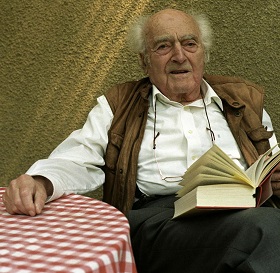
Stefan Heym (10 april 1913 – 16 december 2001)
De Duitse schrijver Richard Wagner werd geboren op 10 april 1952 in Lovrin, in Roemenië. Zie ook alle tags voor Richard Wagner op dit blog.
Uit: Der leere Himmel
„Der rumänische Geheimdienst hat mehrmals Auftragsmörder angeheuert, um Redakteure dieses Senders, rumänische Emigranten, zu überfallen. Schwere Verletzungen erlitt bei einem solchen Überfall im Juli 1981 Emil Georgescu. Er wurde in seinem Hauseingang mit 26 Messerstichen traktiert. Ungeklärt ist bis heute der Tod des populären Musikredakteurs Cornel Chiriac, dessen Sendung »Metronom« einen immensen Einfluß auf die rumänische Jugendkultur hatte. Mindestens zwei Generationen haben ihm ihren Bezug zur westlichen Popkultur und auch ihre Politisierung zu verdanken. Chiriac wurde 1975 in einem Münchner Park tot aufgefunden. Die rumänische Securitate versorgte die Carlosgruppe mit falschen Pässen. Im Vorfeld der Aktion »Münchner Tango« wurde Carlos vom stellvertretenden rumänischen Geheimdienstchef, dem General Nicolae Plesija, empfangen. Der Anschlag auf Radio Free Europe, der am 21. 2. 1981 ausgeführt wurde, war von Budapest aus vorbereitet worden. Der ungarische Geheimdienst war über die Aktion im Bilde. Die schlampig arbeitende Terrorschickeria der Carlosgruppe traf aber fälschlicherweise die tschechische Abteilung des Senders. Und dann kamen Wende und Vereinigung, und die Demokratie hielt Einzug in Osteuropa. Die Restaurants waren plötzlich nicht mehr jugoslawische Restaurants, sie hießen zwar weiterhin Dubrovnik und Split, aber sie führten jetzt kroatische und internationale, manchmal ausdrücklich europäische Küche. Keiner fuhr mehr an die Adria und kaum noch einer ans Schwarze Meer. An der Adria, an der Fernseh-adria, wurde geschossen, und am Schwarzen Meer regierte das Nichts.“
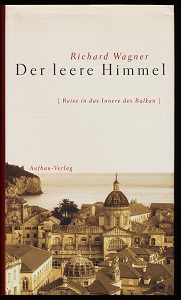
Richard Wagner (Lowrin, 10 april 1952)
Cover
De Vlaamse dichter en beeldhouwer Marcel van Maele werd geboren in Brugge op 10 april 1931. Zie ook alle tags voor Marcel van Maele op dit blog.
Luistervink
In dit verlaten labyrint,
waaruit zelfs de voornaamwoorden zijn ontsnapt,
dwaalt de dichter als belleman
vermomd. Vogelvrij, denkt hij.
Zo treedt hij op in dit gedicht
en loopt verloren.
Geen kat in dit godvergeten gat:
een vogelschrik vol ongemak,
een praatpaal in de vlakte, stom en doof,
een praalgraf in pronkzucht verzonken.
En op de gebarsten steen troont, in vol ornaat,
een marmeren vink luisterend naar de stemmen
van weleer. Hier stokt het stoken.
Van labyrint tot graf vervreemden de beelden
en ketenen vriend en vijand aan elkaar.
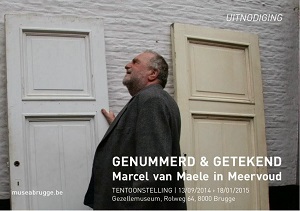
Marcel van Maele (10 april 1931 – 24 juli 2009)
Uitnodiging voor een tentoonstelling in Brugge
De Amerikaanse schrijver Eric Knight werd geboren op 10 april 1897 in Menston in Yorkshire, Engeland. Zie ook alle tags voor Eric Knight op dit blog.
Uit: Lassie Come-Home
“A dog,” the old man said. He shaded his eyes with his hand. The artist did the same. “So it is. I can see now.” Now that he was satisfied, Freeth made as if to turn to his painting, but the older man still gazed steadily. His attention brought the artist back to steady staring. “A collie,” McBane said. “Now what would it be doing .. .” “Oh, probably one from somewhere around—a farm dog.” The Scotsman shook his head. Gazing steadily, he saw the animal come to the water’s edge and wade in several feet. Then it backed away, ran along the bank several yards, and tried again. It kept repeating this, as if at some new spot it would find the water had disappeared and dry land was at its feet. “Havers, Mr. Freeth. It looks as if it’s seeking to cross.” “Perhaps it wants to follow us to the island.” “Nay. It’s seeking to cross.” As if to remove all doubt, they heard a querulous whine—a short series of lifting cries such as a dog makes when it finds itself barred by something that surpasses its understanding. “Aye, it’s wishful to cross,” the Scot repeated. “I think I’ll tak’ a row across by there and . . .” As he spoke, he walked to the beach and lifted the bow of the rowboat. The shipped oars thumped in the rowlocks, and the noise went eddying across the still surface of the loch. At that moment Leslie Freeth saw the dog lift its head and then turn away.”
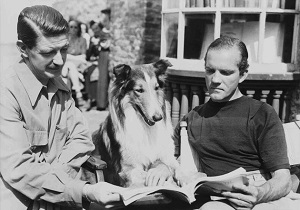
Eric Knight (10 april 1897 – 14 januari 1943)
Eric Knight, Lassie en regisseur Fred M. Wilcox op de set van Lassie Come Home, 1943
Zie voor nog meer schrijvers van de 10e april ook mijn blog van 10 april 2016 deel 2.

